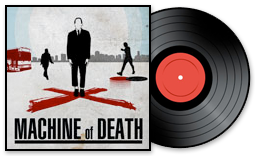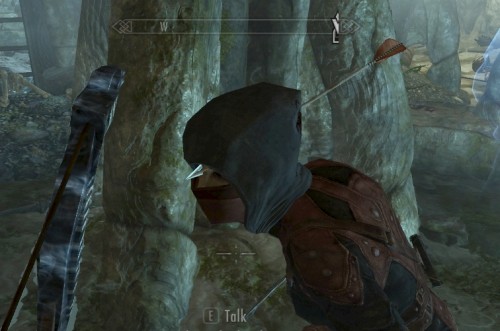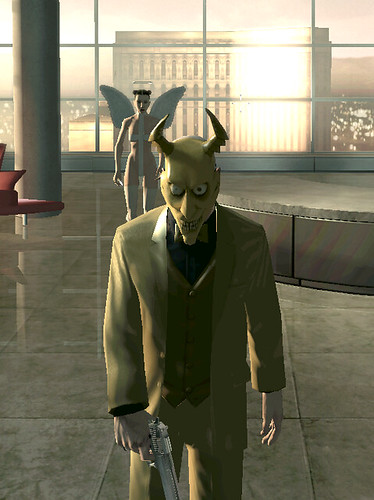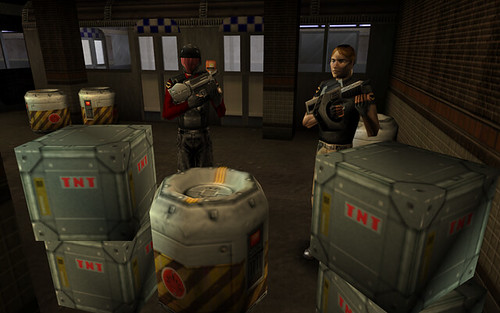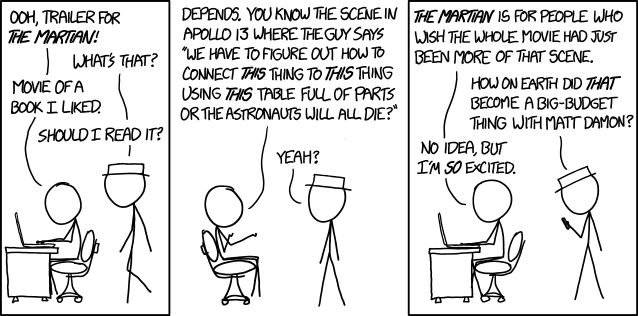TOM FRANCIS
REGRETS THIS ALREADY
Hello! I'm Tom. I'm a game designer, writer, and programmer on Gunpoint, Heat Signature, and Tactical Breach Wizards. Here's some more info on all the games I've worked on, here are the videos I make on YouTube, and here are two short stories I wrote for the Machine of Death collections.
Theme
By me. Uses Adaptive Images by Matt Wilcox.
Search
The Podcast Of My Machine Of Death Story Is Out
The stories from the Machine of Death collection are being gradually released as a free podcast, a sort of episodic audiobook. Mine just came out, read rather excellently by Christopher Joseph. Warning! Strong language from the first word. Continued
The PC Gamer Blog
Most of last week, I wrote things on the internet instead of in a magazine. We’re ramping up our efforts on the PC Gamer blog by around 5,000%, to see if people like it enough to justify developing it into something more. So with a few exceptions, my job for a while will be ‘blogger’ – a thing I have been doing for fun since 1995. This is exciting! Here’s some of the stuff we did last week:
My five favourite games ever, in which I am paralysed, dismembered and killed. (Plus Graham’s, Rich’s and Craig’s).
Tim’s guide to horribly rushing people in Starcraft 2. And what they can do about it.
Five good things about Supreme Commander 2 you don’t get from the demo – my attempt to explain the game’s virtues better than its own ill-chosen demo managed. I wish I’d done this for the Hitman: Blood Money demo back in the day, too.
Why I love the Adaptor in Supreme Commander 2. The game’s best unit is tiny.
Our Napoleon: Total War review, and what Creative Assembly changed in response to it.
Tom Robert’s open letter to PopCap claiming that they stole 800 hours of his mother’s love. Tom will go far.
Craig’s tale of touching camaraderie in STALKER: Call of Pripyat. AIs must get confused by the player sometimes.
You can subscribe to all the PC Gamer stuff here. Your thoughts much appreciated.
The Order of the Phoenix

Right, that’s it. If Transformers isn’t any good on Sunday, I’m giving up on fun-but-dumb films altogether – I no longer enjoy them. I didn’t like the latest Pirates of the Carribean, I hated Die Hard 4, and last night even Harry Potter left me cold. My brain just doesn’t have enough to do during these, which is really saying something given that I enjoyed Gerry, a film where the memorable quotes page on IMDB constitutes the entire script, and the only two characters have the same name.

So I either think about other things entirely (is this seating arrangement socially optimal? Almost, I decided), or pick holes. That CGI object isn’t correctly synced with the actor’s hand. The next line is going to be “Something to fight for.” Emma Watson can only act during even-numbered minutes of the odd-numbered Harry Potter films.
When I read the same story in book form, I cared about everything. And really, it’s a story that suits cinema better than literature in a lot of ways – the fizz and crackle of wizardly battling comes across very poorly in text. But this director’s concept of being faithful to the book seems to be checking all the subplot boxes, which is impossible to do well in under six hours. So the three most affecting elements of Phoenix are all glossed over with almost comic brevity. Those being:

-
Delores Umbridge’s torture: I thought the actress here was great at portraying her syrupy strain of institutionalised evil, but the real potency of the character comes from the horror of what she makes Harry do. He has to claw her words in his own flesh over and over and over again every night, writing in blood over his scar tissue before it can heal. It’s the repetition that’s galling – that’s why it’s such a wonderfully fiendish play on the familiar punishment of ‘doing lines’ – but in the film we see him do it once. Misses the point, dissolves the horror, defangs Delores.

- Neville Longbottom becoming more than comic relief: after mocking his idiocy for four whole books, Rowling adds a streak of genuine tragedy to Neville, and a sad little stirring of redemption. It’s an easy pluck of your heartstrings, but a resounding one. Here’s how this story is told in the film:
(Neville Longbottom is standing in front a wall looking at a newspaper clipping that shows a photo of his parents. Harry joins him)
Neville: Hi Harry my parents were killed by Bellatrix LeStrange after she tortured them for information I’m proud to be their son but worried that I won’t live up to their good name thanks bye.
Fin
- Harry’s increasingly conflicted relationship with Snape: the entertaining thing about Snape as a villain is that he isn’t one, he’s just an extremely unpleasant good guy. Or so Dumbledore insists, and since he’s virtually God in the Harry Potter universe, we tend to trust his word over even Harry’s judgement.
In Phoenix, Snape is the only one able to teach Harry to defend his mind from Voldemort’s invasive telepathy, an arrangement they both resent enormously. But also a great device not only to force Harry to see Snape as a good guy, but to let both of them find out the truth about each other.

By repeatedly invading Harry’s thoughts, Snape quietly has to face that most of his conspiracy theories about Harry have been wrong. But when Harry inadvertantly gets into Snape’s mind, he has to face that more or less every disparaging thing Snape has said about Harry’s father is true, and a lot worse besides. This is a huge deal, a genuinely quite brave twist, and the most devastating thing that’s happened to Harry so far. His only reason for enduring the increasingly horrible things life puts him through is this dream of living up to the example of his parents, and avenging them.
We do get the moment of discovery itself in the film, inside Snape’s mind, but it’s topped and tailed: it happens almost immediately after the lessons are started, so we get nothing of the way Harry and Snape’s relationship has changed, which is probably the most interesting thing in the book. And we get nothing of the aftermath, which is easily the most important thing in the book.
It feels like they think fans are more interested in seeing every subplot paid lip-service than in any of them being done justice. I could be entirely happy with a film of Phoenix that left out all three of my favourite things about the book, if it just did anything else well. If it just had some downtime, some of the day-to-day stuff that lets you get to like the characters before they get knocked around, I’d care.

The fun of Harry Potter is never the plots, it’s getting to live in their world for a bit. It’s enduring the Dursley’s long enough at the start of each book to be relieved and excited to get back to Hogwarts and his friends. It’s butter-beer in Hogsmeade, non-plot-critical Quidditch. This ruthless, workmanlike cramming the films are so hellbent on is wrecking the magic.
Visually it’s marvelous; another adoring tribute to the universe that matches my imagination beautifully. The effects guys really do care about doing everything justice, and they’ve got the creative juice to manage it all and more. That just makes it more irritating that they’re still using directors who waste it incompetently, when in Alfonso Cuaron they’ve already found the guy who can give the rest of film the character its effects already have.
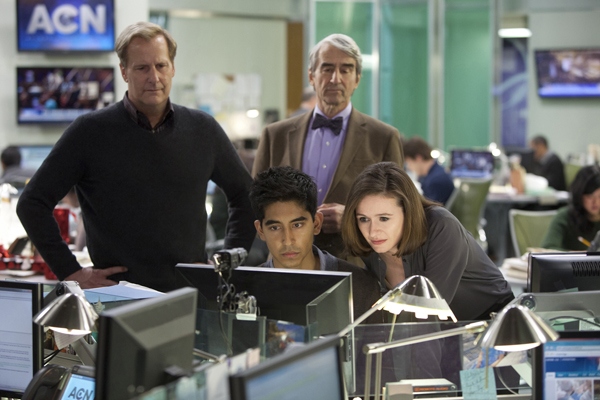
The Newsroom
That leaked Aaron Sorkin script I wrote up a while back is now a show, called The Newsroom. It goes behind the scenes of a nightly news show with a grouchy celebrity anchor, and revolves around him, his new executive producer and the crew. This means I would watch it religiously even if it wasn’t a Sorkin thing – I have no particular interest in the news, but every show or film made about it seems to be great. Continued
The Nameless Mod Is Out, Apparently Great
I’ve been waiting for this enormous, surreal, self-referential net-culture conversion of Deus Ex for ages. It finally came out today, so I immediately carried on playing the game I was reviewing this weekend and then sat outside and wrote it up and then cooked a meal and watched a bit of TV and talked to Kim for a while. But then, right away, I read a review of it.
Richard Cobbett gives it an enormous and extremely enthusiastic write-up on his blog, which makes a good read while the 923MB file is downloading. Lead Designer Jonas Wæver often chimes in here on James, so I’m glad to hear his work wasn’t wasted. I’ll update this post once I’ve given it a fair shake.
If you find your reading and connection speeds are such that you finish Richard’s review some minutes before the mod itself has downloaded, I can recommend from first-hand experience writing a blog post about its availability and the fact that you haven’t played it yet. It leads immediately to enormous popularity and profit.
Update: I’ve played it! A bit. I did the whole training section and watched the intro in full, so I didn’t actually get far into the game proper in the time. I dig the manned security camera mechanic, whereby you can eliminate the guy watching the monitors to neutralise one.
It was actually a guy watching monitors who saw me when I was sneaking around the apartment vents, though, and I had to grab a screwdriver from his desk to stab him in the back of the head with as he set off the alarm. That screwdriver saw some pretty heavy use before I finally succumbed to the summoned security forces, so I think I need to up the difficulty. And not sneak around stabbing security guards with screwdrivers.
All very impressive, and Richard is right, it adopts the Deus Ex motifs well. The voice of the main character seemed particularly good, as far as I played.
The Middleman
A few good ways to win me over, if you’re thinking of making a TV show with just me in mind:
– Female protagonist I don’t hate. Wendy Watson hereby joins the other… three.
– A character who doesn’t take half a fucking hour to get over every surprising turn of events. Writers! The stuff you’re writing didn’t really happen, so watching your characters refuse to believe it happened is not actually terribly entertaining for us!
– Conversely, disbelief at just how idiotic your plot is makes them highly entertaining.
– Max Payne references.
– Scenes where a character starts to say something about what we’re seeing, then thinks better of it.
– Ultra-mild curse words, ideally accompanied by a character who actually does swear her face off at the appropriate times. Somehow that makes the gosh-darnits seem extra mild.
– Ending an episode with a Russian Futurists song. This one was laser targeted at me.
The Maths Of This Week’s Futurama
Futurama hasn’t been this good in years. It’s been very funny this season, and I think most of the movies had some inspired gags, but this week’s was the first time the plot’s been as good as the jokes since the good old days. It did what all the best episodes do: found the humour value in an old sci-fi concept and took it to ridiculous extremes. Continued

The Martian (The Book)
No spoilers
The other day I really wanted something to do that would give my eyes a break from focusing on things right in front of them. So I looked for audiobooks, and remembered that I’d been planning to read The Martian – mostly because of this comic and its hover-text:
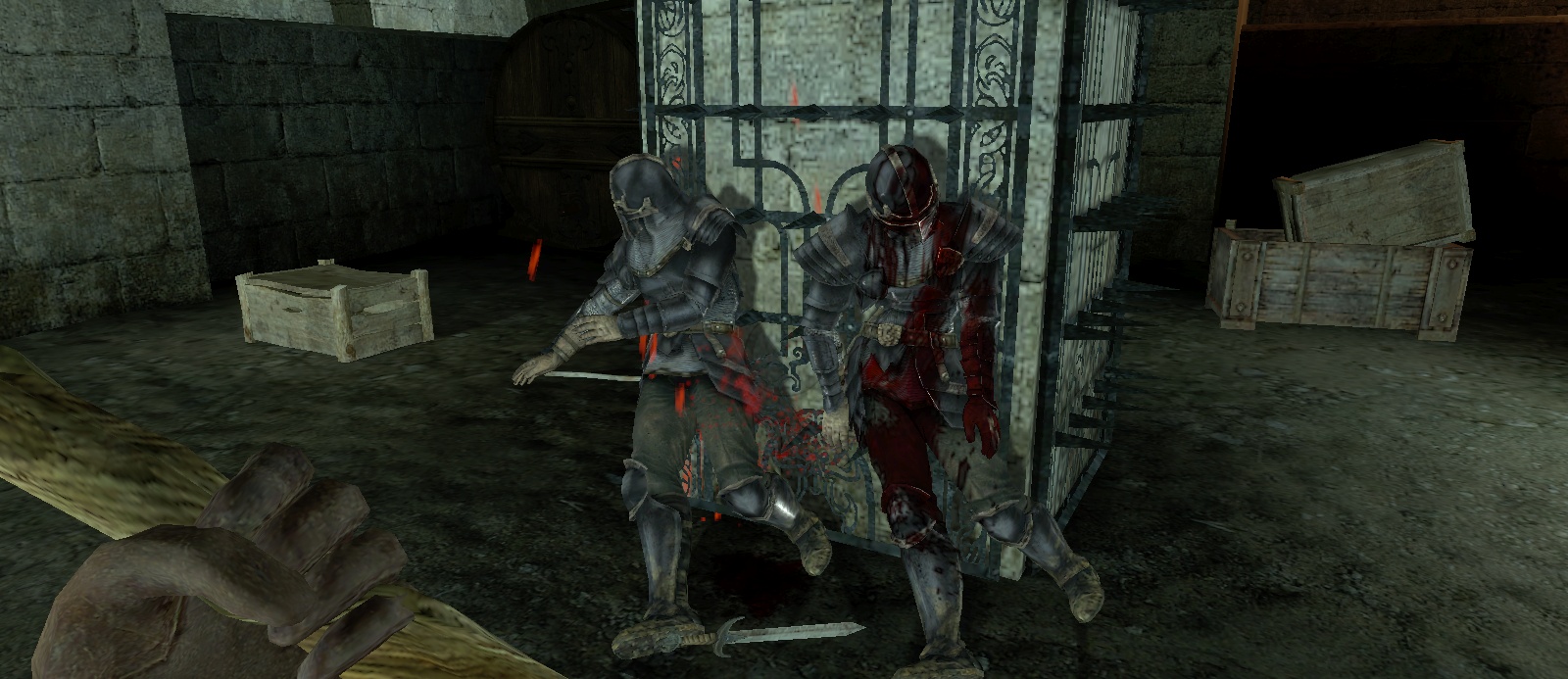
The Magical Logic Of Dark Messiah’s Boot
George Buckenham invited me on his podcast to tell him about a particular thing about a particular game I particularly loved. I picked a conceptually weird bit of logic from Dark Messiah of Might and Magic that makes kicking people more fun. It’s about five minutes.
The Machine Of Death Winners
The winners have been announced for that short story competition I entered a while back, for a collection of stories based around the idea of a machine that can tell you how you’re going to die. They all sound extraordinary. When the winner-notification date came and went without e-mail, I tried and failed to imagine what the winning stories were like, and the selections really show how small-minded I was being.
One of these is about paramedics in the future. One’s about a magician. There are stories about class, revolution, family, the third world, and one that’s just a series of personal ads. And one, inexplicably, is mine. They told me two or three days after I was entirely sure it had been rejected, which I can now confirm is the best way to win something.

The editors – Ryan North of Dinosaur Comics, David Malki of Wondermark and Matthew Bennardo of the world – had planned to self-publish the collection, but have apparently had some interest from actual publishing houses since. So I imagine they’re going to shop the manuscript around for a while and see if someone who could get it out to more than just Amazon.com will snap it up.
Either way the text will be free online, and eventually as an audiobook – sorry, podiobook (spit!). On my contract I waived the right to insist on reading it myself, because I couldn’t decide whether it would be more exciting to be on an audiobook in person, or to have someone good reading my thing. Instead I’m going to audition to read my own, and let them decide. If my voice really is as grave and dull as it sounds to me, hopefully they’ll tell me so and get someone else to do it. I’ve shot myself resoundingly in the foot, of course, by implying my narrator is North American.
What I didn’t know until that announcement post was that all three editors of the collection are including a story of their own. Since Ryan North basically invented a new grammatical logic for the English language in Dinosaur Comics, this is rather exciting. Inevitably his story has the best title of the lot – MURDER AND SUICIDE, RESPECTIVELY – and an immediately enticing concept: two scientists realize that the Machine may allow them to send messages backwards through time.
These three are in addition to the 29 chosen submissions, from 681 entries, so the final book with be 32 stories of something like 4,000 words each. Mine is one of the longer ones, at 6,600, and earned me the king’s ransom of $45, so I’ll be quitting my day job shortly and vacationing on the moon.
That fee is only for the First English Anthology rights, so I can still keep it online here, and will do so until the book itself is out and the whole text of that is online – when I’ll probably link to that instead. I’m imagining it’ll be something like a year before that actually happens, which sucks because I badly want to read almost all of these.
The Life And Inevitable Death Of Bloopi
Every year I fall for one April Fool, usually on April the 2nd because the internet has undermined the transience and therefore the entire freaking point of the day. This year it was this awesome hoax by Braid artist and A Lesson Is Learned But The Damage Is Irreversible hero David Hellman.
Curse you, David Hellman! Your pictures were so alluring that I skipped the highly suspicious intro paragraph and totally sent the link to Tim before I realised it was a big pile of fat blue lies!
Check also out what happened in Guild Wars, if you missed it in my Flickr box down there on the right.
The Left 4 Dead 2 Demo Is Here, And Subpar
Setting aside that Valve have gone back to the bad old days of seeming as surprised as anyone when their stated release dates come and go without event, now that Left 4 Dead 2 is playable I sort of wish it wasn’t.
I stayed up late for the grand, long delayed unlocking on Steam because it’s a Valve game, and Valve games are automatically Events. That’s partly because of the communal sense of excitement as they unlock all over the world at precisely the same time, and partly because they’ve established a level of quality that almost guarantees I’m going to love anything they deem worthy of release. It’s why they can get away with restricting access to this demo, for the time being, to people who’ve already paid for the game.
I don’t doubt Left 4 Dead 2 will be obscenely successful, and I don’t doubt that the full game is far better than what they’ve put out here. But this is the first time since the advent of Steam that getting to play a new Valve game has been a disappointment. It’s the first thing they’ve released in that time that doesn’t have that special Valve feeling: the sense that this is not only something new, but something exquisitely well crafted in every aspect. It’s probably not a coincidence that it’s also the first thing in that time that they’ve developed quickly.
I loved Left 4 Dead’s structure and systems and look, but was never entirely satisfied with its rattly, insubstantial feel. My hope was that Left 4 Dead 2’s dismemberment and frying pans would fix that.
Instead, dismemberment adds little – I wouldn’t notice if a server had it disabled. Melee weapons are unconvincing: swift swipes that pass through everything, and vague staggers from the zombies inconsistent with the hit. And the new guns, which is basically all of them, are worse than the old ones. Almost comically so, in some cases. I had the urge to video some of their puny rasps and feeble gibbers to demonstrate how wrong they’d gone, until I reminded myself everyone would see them.
It’s also truly shoddy, in its current state. After the three hour delay, the first thing that happened on starting it was a command prompt that closed itself. When it finally got as far as the highly cinematic intro, it quit to desktop at the end to announce “Installation complete!”. In-game, the matchmaking ditched me on a 200 ping server at the very end of a map. The engine locked up every few steps for five to ten seconds, looping sounds angrily until I switched to windowed mode. Melee hits frequently make no noise, several zombies forgot where ladders ended and kept climbing into the sky, my character got stuck with his hand protruding gropily as if he longed only to fondle the hordes – as you’ve seen – and then the game crashed my PC completely.
I’d love to say whether the disgusting new infected types add anything to the actual mechanics of the game, but since they’ve repeated the bizarre mistake of the original Left 4 Dead demo and only included half a campaign, there’s nothing approaching a finale to judge them on. In regular play, all three new types seem trivial to deal with – as of course are Hunters, Smokers and Boomers at that stage in a campaign. As I said before, this is as stupid and obtuse as releasing half of a song to promote an album – it doesn’t condemn the full experience, but it marks it with the sour taste of irritation and anticlimax while completely failing to communicate its presumed strengths.
I am baffled by what they’re doing with this. What they show here doesn’t suggest a bad game by any means, but it’s making it look like a clumsy step in the wrong direction. I’m just going to write as much of it off as lag, rushing and a terrible choice of demo as I possibly can.

The Killing Decision In Metal Gear Solid V
This post is part of a series. I mention abilities and tools but no story spoilers.
Almost every game that lets you take people out lethally or non-lethally presents it as a choice between pragmatism and ethics: killing is easier, but tranqing is nicer. That’s true in MGS V too, but it adds something else to that choice that solves a problem I’ve had with these games for ages. Continued
The Heat Signature FAQ
People often ask me: “Tom, frequentlyAskedQuestion[floor(random(frequentlyAskedQuestion.Count))].”
“Well,” I tell them… Continued
